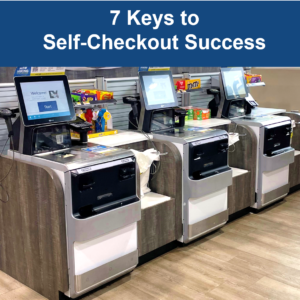
Technology Innovation & Its Impact on Consumer Payments

RetailTEC 2023 is now in the books, and it was one of the most informative and exciting convenience and grocery retail events of the year!
We caught up with Impact 21’s Gabe Olives, EVP of Energy, who was a presenter at this recent gathering of retailers, service partners, and tech innovators held in Dallas, to get his thoughts on the challenges and opportunities facing the industry, now and in the future.
Gabe, we heard you had a great time at the RetailTEC conference. For those who may not know, what is the focus of the conference and who attends?
Well, you heard right – the event was amazing. It was great to see so many leaders in one place learning from each other, networking, and focusing on elevating the industry.
For those who didn’t attend, RetailTEC was a new conference held this year and best described as a place for retailers to find new technology solutions to support their businesses. The 2 ½ day event convenes speakers and retailers to provide insights into the challenges facing the convenience and grocery industries and discuss solutions to keep up with the evolving technology landscape and ever-changing consumer expectations. And the best part? It’s not just for tech professionals – those in marketing, c-suite, finance, and operations also attend – to explore new solutions, learn from experts, and solve current and upcoming challenges.
Thanks for the overview! I know that you were one of the presenters and shared your thoughts on the state of payments and consumer expectations. From your perspective, what are the top two challenges facing convenience and grocery retailers these days?
The latest innovations in technology have forever changed the way consumers interact with retailers. It has enabled new shopping channels, new places to shop, and more ways to make a purchase. We like to say, “as goes technology, so goes payments.” With more and more choice in how we browse, shop, and buy, I think it will be critical for the payment space to keep pace. Tech innovation isn’t slowing down any time soon, so retailers need to stay informed, do honest, ongoing assessments of their current payment ecosystem, and make updates as soon as possible to anticipate the next big development. If not, they’ll find themselves in a challenging situation and risk losing sales, customers, and market share.
I think another possible challenge for convenience and grocery retailers is having the ability to capture, store, and effectively use all the new data that technology innovation brings with it. I’m talking about new sources of customer data and information coming from their partners, like merchandise vendors, 3rd party payments connectors, payment issuers, mobility data providers, and others. A retailer needs to ensure all this information is organized so that the data can be analyzed to create insights which then can be used as actual intelligence tools to manage their businesses most effectively. More data needs to be leveraged effectively to provide insight into consumer behaviors and should be crafted to become actionable. To be clear, we know retailers have made big investments in resources and tools, including people, systems, and processes, focused on this effort, but we have heard from some clients that achieving the ideal level of data integrity and utility has been difficult.
Much of the data remains in silos within individual departments or inconsistently defined and partially integrated. At Impact 21, we help merchants with this challenge. Our Business Intelligence approach creates the right environment to ensure that data management resources and toolsets are making the intended impact and delivering powerful intelligence. We help clients keep pace as innovation continues to accelerate and demands an even faster response for delivering decision-grade insights. Sometimes merchants need a solution-neutral partner like us to come in and help ensure the ideal deployment of their resources and tools.
It seems like there’s a lot for retailers to contemplate with innovation in tech and payments. What do you think is the biggest unlock that can help merchants manage these changes the most?
The first thing I recommend is establishing a strategic framework focused on the merchant’s payments ecosystem to optimize effectiveness and manage fees associated with various payment methods. There’s lots of information, data, and insights to manage and new sources are being ingested by retailers’ systems all the time. With this in mind, their payment ecosystem strategy should include data and insights from all internal and external teams, including the merchandise group, finance team, performance marketing, and field operations groups, AND your POS providers, payment provider, and industry intelligence sources. Consumer insights are equally as important in understanding what’s most important to those key stakeholders. is nimble enough to allow for quick innovation while continuing stability.
Some retailers have asked me, “Why should we invest in a dedicated strategy, aren’t we talking about managing pennies on the dollar?” Well, pennies add up quickly with large transactions and sales volumes over a fiscal year. Payment fees in our industry usually land between the 2nd and 3rd in OPEX. My best advice? Prepare now – don’t wait!
This focused approach to strategy and operations will create a solid foundation to support what’s now required to engage today’s ever-connected consumers. The pace of innovation will continue to accelerate and with every advancement, consumer expectations for a smooth, fluidly connected shopping experience will also increase. So, the current multi-channel selling model is quickly shifting to a true unified commerce strategy. At Impact 21, we believe that transitioning toward the fully integrated, or unified commerce, model is the most effective way to keep the customer at the center of your business strategy and we’ve had great success in doing so. Our Unified Commerce approach is comprehensive, connecting our client’s people, systems, processes, and data, enabling the retailer to consistently deliver their brand experience across every touchpoint, while not losing sales, customers, or profits. This strategy ensures that the customer stays at the center of the merchant’s ecosystem. We have created a great graphic to help others visualize what I’ve described and learn more detail on the approach. Visit the Impact 21 website to download our Unified Commerce factsheet and check it out!
So, I follow Impact 21 on LinkedIn (as we all should!) and have read articles on these topics. I also see that the Impact 21 team has shared thought leadership at other conferences this year. Why is this so important?
Thanks for following us! And I’ll answer your question with one word – Relationships! We cherish the relationships we have with our clients and have the utmost respect for their teams and customers. In fact, we’ve had the privilege of working side by side with some of our clients for over 20 years, helping them adapt and grow their businesses through a lot of change.
So, to be the best partner we can be to our clients, we’re always looking up and out across the industry to know what’s happening now and to keep an eye on what’s next. It’s not enough to just know what’s coming, we keep our clients informed and advise them on what to do about it. They trust us to bring industry-leading insights and recommendations. Attending and presenting at conferences and events is an important way we stay informed so that we can be the catalyst inspiring our clients to achieve peak performance.
If you could look into your crystal ball and give the readers a glimpse into the future, what do you see as the next big innovation that will impact the industry?
The future is actually here and is ever changing! Earlier I mentioned that the ways consumers can make purchases continue to grow…well here we grow again thanks to Amazon One by Amazon Web Services. This cool new tech is being tested in select Amazon Fresh stores and Whole Foods Market stores. Shoppers simply hold their hand over a small device at the POS which reads their palm print to authorize the transaction. Since users add a credit card or debit card along with their loyalty information when enrolling with Amazon to use the technology, the instore experience is fast, convenient, contactless. Consumers have a “near zero effort” check out experience…no need for a wallet or even a phone to pay. This new tech is the next generation of biometrics and it’s very exciting.
It’s true that technology and payments innovation is having a big impact on the grocery and convenience industries. We also need to keep an eye on other factors influencing our space, especially local and national regulations. Right now, for example, there’s pending legislation that will have a significant impact on the way merchants do business. The pending Credit Card Competition Act (CCCA) is intended to create more competition in the credit card industry by requiring credit card issuing banks to offer a minimum of two networks for merchants processing electronic credit card transactions. It specifically only allows Visa and MasterCard to be one of the two networks. You can see this will impact every credit card transaction in the nation. If signed into law, merchants could see lower interchange fees, but based on experience from the original Durbin Act that impacted debit transaction fees, we’ll likely see negative impacts as well. At Impact 21 we’re keeping a close eye on the developments around this potential new law to help our clients be ready for all possibilities.
Any parting words?
Every day, there are new innovations, shiny objects and challenging market forces impacting the way we do business. I get it, it can be a lot to keep up with, but at Impact 21, it’s our job to keep our finger on the pulse of the industry, what it means to our clients, and how to meet the demands of today’s consumer. And I can tell you, we have a lot of fun doing it!
Related Insights
The Changing Role of the CIO
It used to be that a retailer’s chief information officer would spend most of his or her time concerned with […]
CSP Magazine – Ticking Tech Timeline And The Potential Of AI
This article, by Impact 21’s Tom Newbould as a guest author, was published in the January 2024 edition of CSP […]
Burchfield Joins CTVG as Thought Leader in Convenience Technology
Lexington, KY, 9/26/2023 – Impact 21, leading global consulting firm dedicated to helping convenience, retail, and energy clients thrive in […]
7 Keys to Self-Checkout Success
Strategies for Retail Efficiency & Customer Experience Convenience retailers have generally been slower than their fast-moving consumer goods peers to […]
Want to stay in touch? Subscribe to the Newsletter






